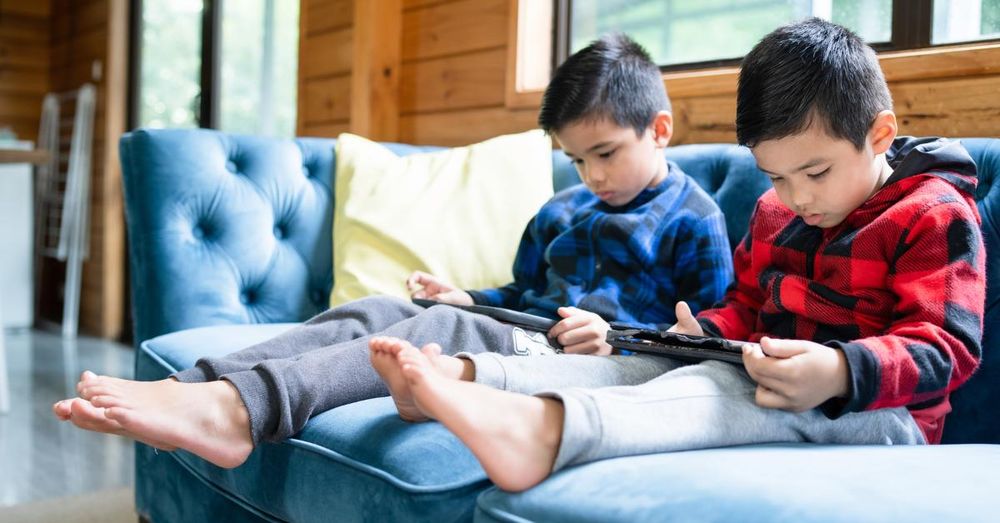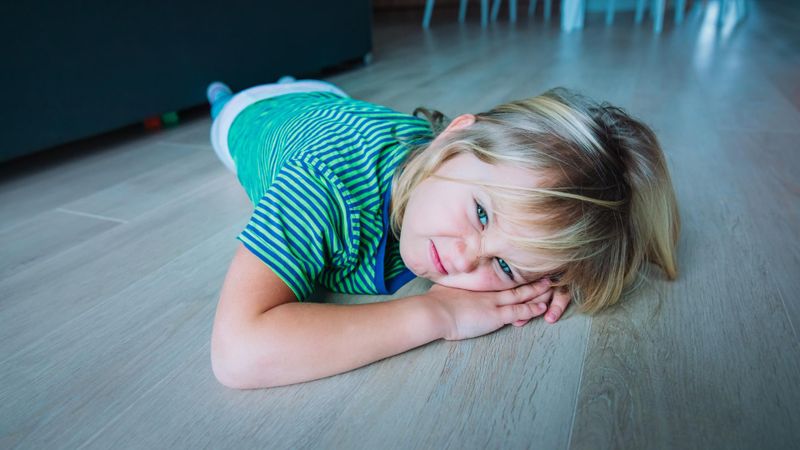SCREEN TIME
How Much Screen Time Is Too Much?
Screens are here to stay. But we now know that too much screen time can be harmful, especially for kids. Let's take a look at recommended screen times, the signs that your kid may be spending too much time in front of screens - and what you can do to create a healthy digital routine for your kid.

5.5 hours. That's the average time kids between 8 and 12 spend in front of a screen - per day. For teens ages 13 to 18, it's as much as 8.5 hours per day. The average time has increased more in the last two years than in the past four years. Why? Covid. And those numbers do not include schoolwork.
So let's just say that right now: That's waaaaay too much screen time.
But What Should Be the Limit?
The guidelines for screen time vary from country to country, even from institution to institution. We recommend the following screen time limits:
- no screen time for kids younger than 3 years
- no more than an hour per day for kids aged 3-6 years
- no more than 1.5 hours per day for kids aged 6-10 years
- no more than 2 hours per day for kids aged 10-13 years
- no more than 2.5 hours per day for teens aged 13-15 years
- no more than 3 hours per day for teens aged 15-17 years
If you are part of the Ohana family, you may have already noticed that we are showing these recommendations based on your kid's age when you set time limits.
How Can You Tell if Your Kid Is Spending Too Much Time in Front of a Screen?
Here are some common side effects to watch out for.
Your kid complains about being tired
Insomnia is one of the most common effects of too much screen time. Screens are very stimulating and the blue light they emit affects our ability to fall asleep. So instead of helping your kid to wind down, screen time before bedtime will wind them up. Look out for the "tired but wired" effect, meaning your kid is tired but can't fall asleep.
Other physical changes to be aware of:
- strained eyes or dilated pupils
- weight issues
- neck pain
- carpal tunnel syndrome
Your kid is constantly overstimulated
Overstimulation is another sign of too much screen time.
Watch for these signs in your kid's behavior:
- making poor decisions
- behaving impulsively
- being inattentive and distracted
- aggression
- irritability
- meltdowns
It's important to keep in mind that overstimulation can have other causes so observe your kid's behavior before jumping to conclusions.

Too much screen time can overstimulate your kid and make them feel irritable.
Other studies confirm that too much screen time can lead to technology addiction, anxiety, depression, social isolation, loneliness, or attention-deficit hyperactivity disorder.
Your kid prefers screens over people
Pay attention to how your kid interacts with others, especially friends. Do they enjoy spending face-to-face time with their peers? Do they have online friends they exclusively talk to online?
If your kid prefers screen time to face-to-face interaction, they may be spending too much time in front of a screen. Now, it's become normal for kids to stay in touch with their friends via text messages or social media - but it's important for kids to have face-to-face time with others. This helps them understand nonverbal communication skills and learn to empathize with others.
8 Ways to Reduce Screen Time and Create Healthy Digital Habits
1. Set screen time limits
Introduce limits to create a healthier digital routine. Make sure to talk to your kid about this and explain your reasons. You may want to gradually reduce screen time, for example, by cutting down 15 minutes each day. Tip: With Ohana, you can set individual limits and schedules for each day of the week.
2. Introduce focus time
You may have noticed about yourself that looking at your phone can completely distract you from a task you were working on. So when your kid is doing their homework, their phone should be far away from them. It's focus time. Tip: You can use Ohana to put your kid's phone into Study Mode.
3. No screens before bedtime
To avoid the "tired but wired" effect, turn off all devices at least an hour before bedtime. Instead, choose calming activities such as reading. Tip: With Ohana, you can lock your kid's phone so they are not tempted to look at it.
4. Lead by example
How much time do you spend in front of screens? Think about it: If you are constantly on your phone, your kid will want to do the same. Look at your own screen time behavior and consider making changes.
5. Have meals without screens
Enjoy your family meals together - without any screens. Stack your phones in the middle of the table or put them all in a basket and talk about each other's days. This may be a bit of a challenge with teenagers but they'll eventually enjoy it, you'll see.
6. Use alternatives to screens
There are so many other fun activities that your kid will enjoy than looking at a screen. Do arts and crafts, learn how to play an instrument, play sports outside. Think about your own childhood - what did you enjoy doing back then?

Kids develop motor skills and can be creative when doing crafts.
7. Make the most of your kid's screen time
It's important to pay attention to how your kid is actually spending their screen time. Are they watching videos on social media? Or playing an educational game? Choose age-appropriate, high-quality content and apps for and together with them. This way, your kid will benefit from their screen time. Tip: We have compiled a list of great educational apps for your kid.
8. Don't use screen time as a reward or punishment
"If you clean your room, you get an extra half hour playing that game on your phone." Sounds familiar? As a study found out, using screen time as a reward or punishment is comparable to food. For example, let's look at this statement: "If you clean your room, you get a piece of cake." Why is this problematic? Because using sugary treats as a reward increases your kid’s appeal to them. It's the same with screen time: When you use it as something your kid gets when they are good or lose when they are naughty, you put too much importance on it. Instead, normalize its use.